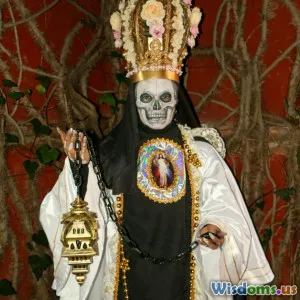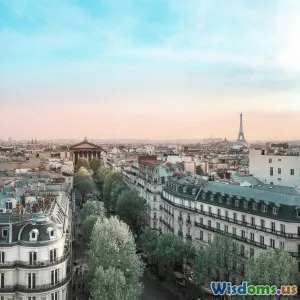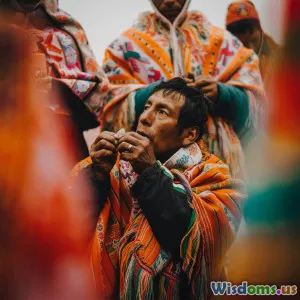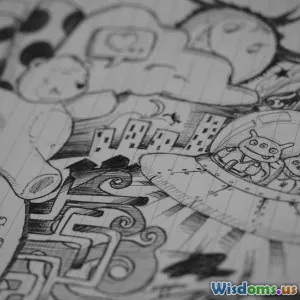
Supernatural Beliefs Across Cultures
9 min read Discover diverse supernatural beliefs across cultures, exploring rituals, gods, and myths that shape human experience worldwide. (0 Reviews)
Supernatural Beliefs Across Cultures
The mysteries of the supernatural have captivated the imaginations of people around the world for centuries. From ancient folklore to modern-day spirituality, cultures have bled myth and ritual, attempting to explain the inexplicable. These beliefs shape identity, provide comfort, and often represent moral lessons. Let’s embark on a global journey to uncover the fascinating realm of supernatural beliefs and the myriad ways they manifest across different cultures.
The Concept of the Supernatural
The term supernatural typically refers to phenomena that exceed natural explanations or the laws of nature. Supernatural beliefs can include gods, spirits, ghosts, witches, and otherworldly entities. Across cultures, these beliefs serve various functions, including explaining natural events, providing ethical guidance, and offering a framework for understanding life and death.
1. Indigenous Beliefs and Spirits
Indigenous cultures around the world often exhibit rich supernatural beliefs intimately tied to their environment. Myths and rituals serve to honor the land and maintain balance within ecosystems. Often, these beliefs emphasize a symbiotic relationship between humans and nature.
a. Native American Spirituality
In many Native American cultures, the belief in spirits that inhabit natural objects and animals is pervasive. For instance, the Lakota people honor the Wíiyukta, or spirit of the buffalo, as a source of life and sustenance. Rituals often involve songs, dances, and ceremonies intended to connect humans with ancestral spirits and ensure harmony with nature.
b. Australian Aboriginal Beliefs
Aboriginal Australians prioritize the Dreamtime, a series of stories that explain the creation of the land and its inhabitants through ancestral beings. These beings often take the form of spirits inhabiting animals and natural events. Through storytelling, song, and dance, Australians express their connection to the Dreamtime, celebrating their profound respect for existence and nature.
2. Deities and Mythology
Across cultures, gods and deities play significant roles in shaping beliefs about the supernatural. These entities are often personifications of natural forces or concepts that govern life, death, and morality.
a. Ancient Greek Mythology
In ancient Greece, mythology featured a pantheon of gods and goddesses, each governing different aspects of life. Zeus, the king of the gods, represented authority and fate, while Athena, the goddess of wisdom, symbolized intellect and martial strategy. These narratives constructed a framework through which people understood the human experience, nature, and moral behaviour.
b. Hinduism and the Divine
In Hindu beliefs, deities such as Brahma, Vishnu, and Shiva represent the creator, preserver, and destroyer aspects of the universe. For Hindus, the supernatural parallels natural events through numerous myths that illustrate the power struggles of gods and the lessons learned therein. The rich tapestry of Hindu mythology serves to connect believers with concepts of dharma (duty) and karma (action and consequence).
3. Ghosts, Spirits, and the Afterlife
The supernatural realm often includes thoughts and beliefs concerning the afterlife, presenting a way for cultures to make sense of mortality. Ghosts and spirits are typically perceived as remnants of those who have passed on—expressing their unfinished business or unresolved emotions.
a. East Asian Beliefs
In Buddhism, particularly within Eastern practices, ancestors are often revered and believed to play an active role in the lives of the living. In China, the ghost festival provides a formal space for families to honor their deceased with offerings, demonstrating respect and ensuring assistance from the spirit realm. Cultural festivals reinforce social bonds, maintaining connections between the present and the past.
b. Western Perspectives
Western culture often conceptualizes ghosts through folklore and horror stories—think of American ghost stories or the infamous haunted places like the Stanley Hotel. In this context, ghosts are often seen as spirits that have unfinished business or seek revenge. This portrayal raises questions about mortality and the nature of existence, inviting reflection on our fears and beliefs about the afterlife.
4. Witches, Magic, and Ritual Practices
The belief in witches and magical practices stems from a mixture of historical, social, and economic factors. These narratives often reflect societal fears and the consequences of deviation from social norms.
a. European Witch Trials
The European witch trials of the 15th to 18th centuries provide a gripping narrative about supernatural beliefs within societies. Accusations of witchcraft often stemmed from fear and misunderstanding, leading to grievous outcomes. This phenomenon reflects how cultural fears can morph the supernatural into a societal tool for control.
b. African Traditional Religions
Conversely, in various African cultures, the occult is often intertwined with healing practices and rituals. For instance, the Zulu culture incorporates beliefs in the “sangoma,” a healer who uses communication with the ancestors to remedy ailments. This illustrates a positive association with the supernatural, contrasting sharply with the accusations thrown during the witch trials.
5. Supernatural Beliefs in Contemporary Society
Modernity hasn’t diminished the allure of the supernatural. The resurgence of interest in witchcraft, spiritualism, and new age practices indicates that humanity continues to seek explanations beyond the material.
a. Popular Culture and Entertainment
Movies like Harry Potter or The Conjuring depict supernatural themes, bridging ancient beliefs with contemporary narratives. These portrayals reflect modern society’s fascination with magic, spirits, and the metaphysical, reinforcing cultural ideas while reshaping perceptions of the supernatural realm.
b. The Rise of Spiritualism
Additionally, the rise of spiritualism in recent years—ushered by social media platforms—has popularized discussions on ghost encounters, supernatural experiences, and a resurgence in community spirit circles. The spectrum of belief is widening, with more people openly discussing personal experiences that once would have been deemed taboo.
Conclusion
Supernatural beliefs reveal much about the human psyche and its relationship with the environment, the unknown, and mortality. As we’ve seen throughout cultures worldwide, these beliefs not only provide frameworks for understanding the world but also foster community, connection, and moral lessons. From reverence for nature to sophisticated pantheons of gods, the exploration of the supernatural is as multifaceted and diverse as humanity itself. Understanding these perspectives allows us to appreciate the depths of our cultural realities and fuels our curiosity about what lies beyond our comprehension.
Through investigation and openness, we not only engage with the enigmatic realm of the supernatural but also enhance our understanding of the intricate tapestry of human beliefs and values.
Rate the Post
User Reviews
Popular Posts





















